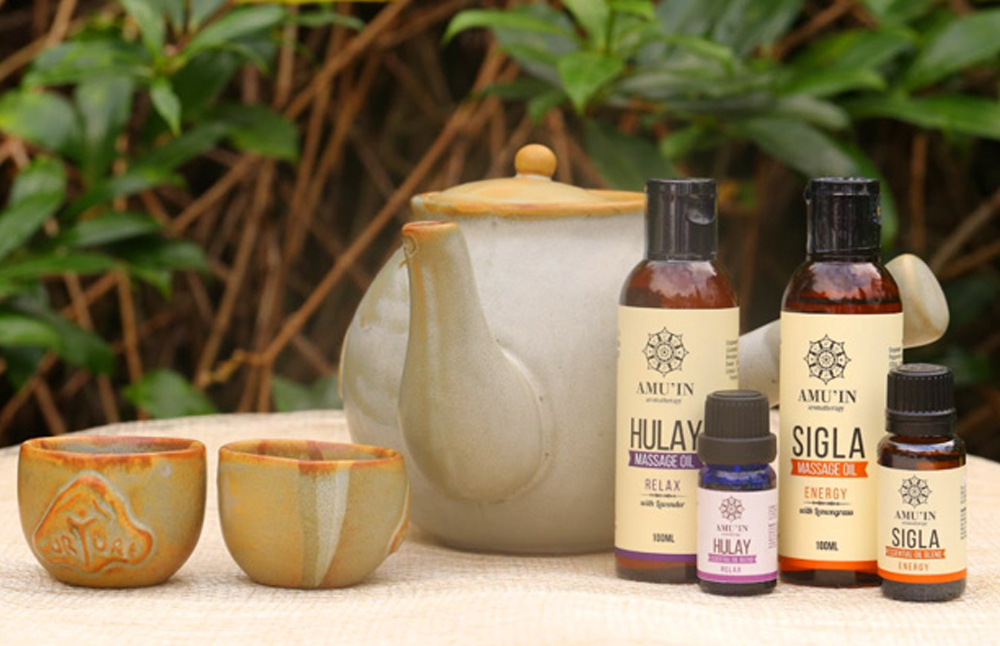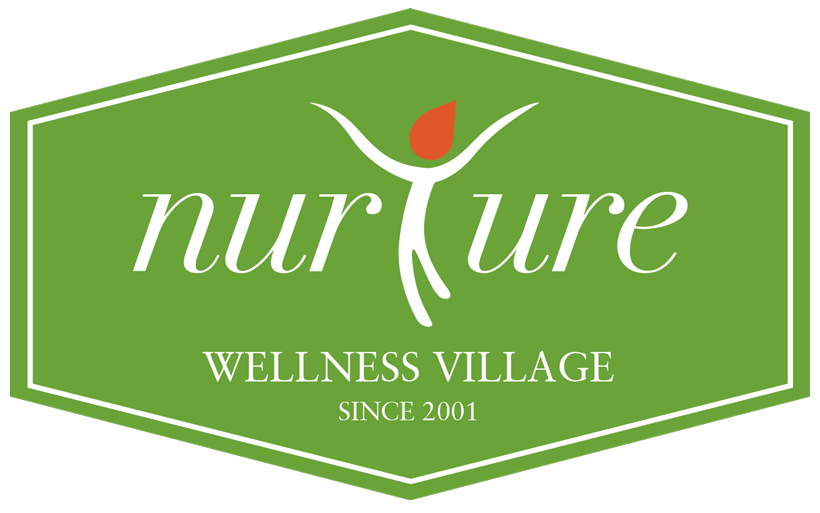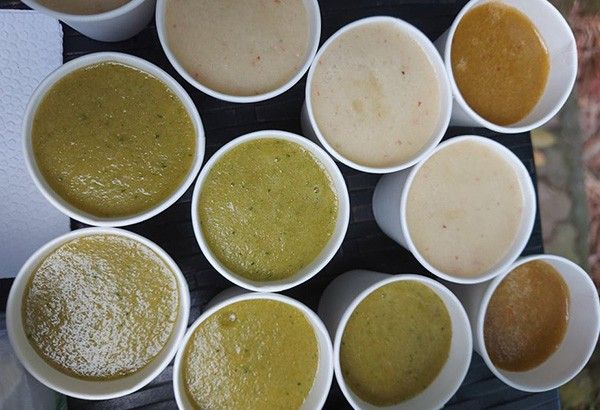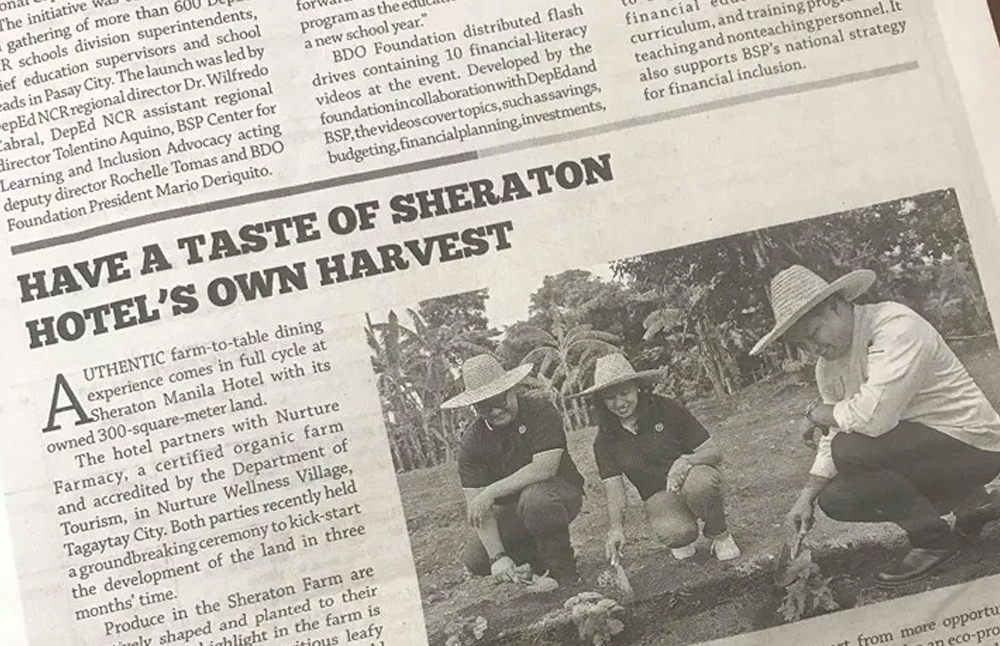
Inquirer Feature (Massage Oil Aromatherapy)
PH is therapeutic for Nurture Spa’s resident massage oil maker
When British businessman Michael William Turvill was helping his Filipino wife Cathy Brillantes put up Nurture Spa in Tagaytay, he wasn’t amazed with the massage oils initially offered. With a PhD in organic chemistry from the University of Nottingham, Turvill noticed the massage oils merely contained fragrances instead of the essential oils needed for healing effects.
“I could do these cheaper and better,” he said to himself. He later developed authentic massage oils that contained therapeutic essential oils, such as those from sweet almond and grape seed. These carrier oils temper the strong essential oils and lubricate the skin.
From producing massage oils for Nurture Spa, Turvill has since established Hotel & Spa Essentials (HSE) where he is currently chair. The company supplies hotels with guest amenities, ranging from toiletries to towels and mini bars.
His company now has 25 employees. Not wanting to disclose figures, he says sales have “grown significantly” and the business now has a client base of over 50 hotels and resorts from Baguio to Davao.
His company now has 25 employees. Not wanting to disclose figures, he says sales have “grown significantly” and the business now has a client base of over 50 hotels and resorts from Baguio to Davao.
Urgency
Before settling in the Philippines, Turvill worked for 12 years at Unilever, a global consumer goods company known for its hygiene and personal care products. He started out as a management trainee in the United Kingdom.
In 1996, Unilever merged with another cleaning and hygiene product company to form DiverseyLever. Turvill was assigned in China to rebuild the DiverseyLever factory in Zhongshan. His job exposed him to the world of chemicals for laundry and dishwashing. He also supplied the hospitality industry with toiletries. Among his clients then were the catering departments of the Hong Kong International Airport and the Shangri-La Hotels. Turvill later headed the food and beverage division, where he learned more about sales and urgency in business.
In 1996, Unilever merged with another cleaning and hygiene product company to form DiverseyLever. Turvill was assigned in China to rebuild the DiverseyLever factory in Zhongshan. His job exposed him to the world of chemicals for laundry and dishwashing. He also supplied the hospitality industry with toiletries. Among his clients then were the catering departments of the Hong Kong International Airport and the Shangri-La Hotels. Turvill later headed the food and beverage division, where he learned more about sales and urgency in business.
“It wasn’t enough to be just technical. My boss wanted to understand the pressures of sales people,” says Turvill.
He was then sent to Manila to work as DiverseyLever’s regional technical director. Three days upon his arrival in 2001, he met his future wife, Cathy, at a social event.
Kidnapping
His work and love life were disrupted by a kidnapping threat in 2003. The reason is still unknown until today. Turvill was thus ordered by the head office to move to Singapore.
But Turvill wanted to follow his heart. He resigned and settled in the Philippines in 2004 to start his life with Cathy.
Turvill financed the spa amenities business through his savings as an expat.
A turning point for the business came when one of Nurture Spa’s staff members attended a funeral. The staff told a guest there she was working for a destination spa that produced its own massage oils.
The guest, a director for Plantation Bay Resort in Cebu, said she wanted to buy affordable but quality oils since importing was very costly.
“We had to form a company to do the invoices. To this day, Plantation Bay is still our customer,” says Turvill.
Besides concocting his own massage oils, Turvill also became a distributor for foreign beauty brands.
As Nurture Spa’s business expanded, Turvill observed that 80 percent of its products were for body massages while the rest were for facials. Clients didn’t mind using local massage oils, but they wanted a foreign brand for their facials to be reassured of quality.
Turvill also recalls offering his massage oils to Shangri-La’s Chi Spa, but the latter already had a supplier.
Still, the spa needed a distributor for imported skin care products. Thus, he was tapped to handle the German brand, Biodroga, and the French brand, Algotherm.
But Turvill wanted to follow his heart. He resigned and settled in the Philippines in 2004 to start his life with Cathy.
Turvill financed the spa amenities business through his savings as an expat.
A turning point for the business came when one of Nurture Spa’s staff members attended a funeral. The staff told a guest there she was working for a destination spa that produced its own massage oils.
The guest, a director for Plantation Bay Resort in Cebu, said she wanted to buy affordable but quality oils since importing was very costly.
“We had to form a company to do the invoices. To this day, Plantation Bay is still our customer,” says Turvill.
Besides concocting his own massage oils, Turvill also became a distributor for foreign beauty brands.
As Nurture Spa’s business expanded, Turvill observed that 80 percent of its products were for body massages while the rest were for facials. Clients didn’t mind using local massage oils, but they wanted a foreign brand for their facials to be reassured of quality.
Turvill also recalls offering his massage oils to Shangri-La’s Chi Spa, but the latter already had a supplier.
Still, the spa needed a distributor for imported skin care products. Thus, he was tapped to handle the German brand, Biodroga, and the French brand, Algotherm.
“That was my lucky break,” he says.
Innovations
During the global economic downturn in 2008, Turvill took up graduate studies under Eduardo Morato Jr., chair of the Asian Center for Entrepreneurship and Management Education, Inc. at Ateneo de Manila.
Turvill considers Morato his “guru” who taught him critical thinking, allowing him to analyze a situation and evaluate and see its implications.
“You study the market and determine the point of differentiation between you and your competitors,” he says. Turvill cites HSE’s innovations such as bringing in eco-friendly products and luxury guest amenities by Ferragamo, Thierry Mugler, Clarins, Bulgari and Yves Rocher, customizing toiletries for high-end resorts and creating generic products for three-star hotels.
“You compete on quality, delivery and price,” says Turvill. Since smaller hotels and resorts can’t afford huge and expensive orders, HSE also offers a plan whereby clients can order smaller and manageable quantities.
On customized amenities, Turvill says local production for bath gels, lotions, shampoos and conditioners was not feasible. “The packaging was not good here. We were going to import from China and fill them here. But, when you import empty tubes, you pay 15 percent duty. When you import a filled tube, it’s zero duty. The guest amenities are mostly made in China, but the top-end brands have to be imported from Europe,” he says.
Still, HSE is proud of its home-grown brands. Amuin (Filipino for “to soothe”) is the aromatherapy and toiletry line made in Parañaque. Island Breeze, meanwhile, is the firm’s guest amenities line developed for resorts. Responding to the green movement, HSE will soon launch Likha (Filipino for “creation”), a line of organic personal care products. Since Filipinos have a penchant for French products, HSE will also introduce Jardin (French word for “garden”) that will be infused with verbena.
Turvill notes the products’ packaging is biodegradable. HSE also offers energy-saving towels that dry faster, he says. “The guest may not notice the difference, but the hotel saves money,” says Turvill.
“You study the market and determine the point of differentiation between you and your competitors,” he says. Turvill cites HSE’s innovations such as bringing in eco-friendly products and luxury guest amenities by Ferragamo, Thierry Mugler, Clarins, Bulgari and Yves Rocher, customizing toiletries for high-end resorts and creating generic products for three-star hotels.
“You compete on quality, delivery and price,” says Turvill. Since smaller hotels and resorts can’t afford huge and expensive orders, HSE also offers a plan whereby clients can order smaller and manageable quantities.
On customized amenities, Turvill says local production for bath gels, lotions, shampoos and conditioners was not feasible. “The packaging was not good here. We were going to import from China and fill them here. But, when you import empty tubes, you pay 15 percent duty. When you import a filled tube, it’s zero duty. The guest amenities are mostly made in China, but the top-end brands have to be imported from Europe,” he says.
Still, HSE is proud of its home-grown brands. Amuin (Filipino for “to soothe”) is the aromatherapy and toiletry line made in Parañaque. Island Breeze, meanwhile, is the firm’s guest amenities line developed for resorts. Responding to the green movement, HSE will soon launch Likha (Filipino for “creation”), a line of organic personal care products. Since Filipinos have a penchant for French products, HSE will also introduce Jardin (French word for “garden”) that will be infused with verbena.
Turvill notes the products’ packaging is biodegradable. HSE also offers energy-saving towels that dry faster, he says. “The guest may not notice the difference, but the hotel saves money,” says Turvill.


